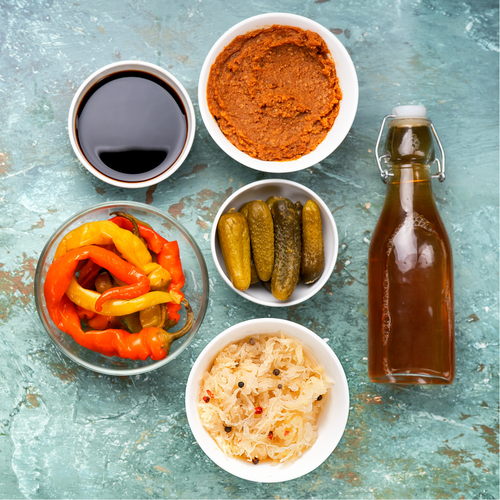Just as the body temperature is optimal at 37°C, there is also an optimal pH. These are essential parameters that allow the body to function properly. It is called the acid-base balance .
What is acid-base balance ?
Acid-base balance is the balance between the body's acidity and alkalinity levels . This balance is mainly influenced by our diet, since each food is acidic, neutral, or basic.
To maintain a good pH, the body is equipped with "buffer" systems that instantly neutralize excess acidity. But these mechanisms are not always sufficient; their capacity is limited and they diminish over time. Nowadays, many factors such as processed food, additives, pesticides, alcohol, cigarettes, pollution, and stress increase the acidity of our bodies .
How do you measure the acidity of a food?
To measure the acidifying or alkalizing nature of a food, German acid-base balance specialist Thomas Remer developed an index called PRAL, short for Potential Renal Acid Load . If the number is greater than zero, the food is considered acidifying, and if it is negative, the food is considered alkalizing, with a value of "zero" indicating neutrality.
What foods alter our acid-base balance?
All ingested food gives rise to acids and bases in the body.
Acid-forming or "acid-producing" foods generate more acids than bases. These are mainly animal proteins (meat, fish, eggs, dairy products) and cereals (wheat, rye, oats, barley, spelt, etc.).
Alkalizing foods generate more bases than acids. These are mainly fruits and vegetables.
Neutral foods, on the other hand, have no influence on the acid-base balance . These include, for example, vegetable oils and refined sugars.
The body naturally manages to maintain acid-base balance , but only within certain limits. Studies suspect that a highly acidifying diet is linked to several risks for bone, kidney, muscle, and cardiovascular health.
Here are some examples of foods and their PRAL index:
- Parmesan: 27.8
- Veal escalope: 18.7
- Wholemeal flour: 10.2
- Cod fillet: 9.9
- Chicken eggs: 7.2
- Egg pasta: 6.4
- Whole milk: 0.1
- White sugar: 0
- Honey: - 0.9
- Blackcurrant/Potato: - 5.2
- Raw carrot: - 5.7
- Banana: - 6.9
- Spinach: - 10.3
Our advice for maintaining a good acid-base balance?
1 - Limit salt intake to maintain acid-base balance
To avoid acid-base imbalance, it is best to limit salt, and more generally chlorides present in high doses in rye bread, ketchup, black olives, raw ham, Roquefort cheese and even shrimp.
2 - Avoid sodas
Sugary soft drinks contain acids, such as phosphoric acid, which contribute to acid-base imbalance. They also promote bloating and flatulence, so it's best to avoid them.
3 - Limit the consumption of animal proteins
To maintain an acid-base balance , it is best to review your consumption of animal protein, especially meat, and especially gamey meats. Fish and eggs should also be limited. Favor less acidic vegetable proteins.
4 - Avoid excess cereal products to preserve the acid-base balance
To give you an idea, your plate should contain a maximum of ¼ of cereal products. If you prefer to eat toast for breakfast, then change your starchy food for lunch and opt for rice or potatoes. The important thing is to limit your cereal consumption and vary it to maintain a good pH.
5 - Increase your consumption of alkalizing foods
An alkalizing food is one whose Pral index is negative. These include fruits and vegetables, as well as spices, but also tea and herbal teas.
6 - Favor foods rich in potassium
Potassium is an essential nutrient for the functioning of "buffer systems." We rely on these foods: lentils (810 mg per 100g), dried dates (790 mg per 100g), prunes (732 mg per 100g), almonds (705 mg per 100g), spinach (662 mg per 100g), avocado (650 mg per 100g), chestnuts (600 mg per 100g), mushrooms (520 mg per 100g), walnuts (450 mg per 100g), apricots (440 mg per 100g).
Sources :
[1] Quade BN, Parker MD, Occhipinti R. The therapeutic importance of acid-base balance. Biochem Pharmacol. 2021 Jan;183:114278. doi: 10.1016/j.bcp.2020.114278. Epub 2020 Oct 9. PMID: 33039418; PMCID: PMC7544731.
[2] Gomez H, Kellum JA. Understanding Acid Base Disorders. Crit Care Clin. 2015 Oct;31(4):849-60. doi: 10.1016/j.ccc.2015.06.016. Epub 2015 Aug 13. PMID: 26410149.
[3] Casimir GJ, Lefèvre N, Corazza F, Duchateau J, Chamekh M. The Acid-Base Balance and Gender in Inflammation: A Mini-Review. Front Immunol. 2018 Mar 7;9:475. doi: 10.3389/fimmu.2018.00475. PMID: 29593728; PMCID: PMC5854649.
[4] Osuna-Padilla IA, Leal-Escobar G, Garza-García CA, Rodríguez-Castellanos FE. Dietary Acid Load: mechanisms and evidence of its health repercussions. Nefrologia (Engl Ed). 2019 Jul-Aug;39(4):343-354. English, Spanish. doi: 10.1016/j.nefro.2018.10.005. Epub 2019 Feb 5. PMID: 30737117.

















